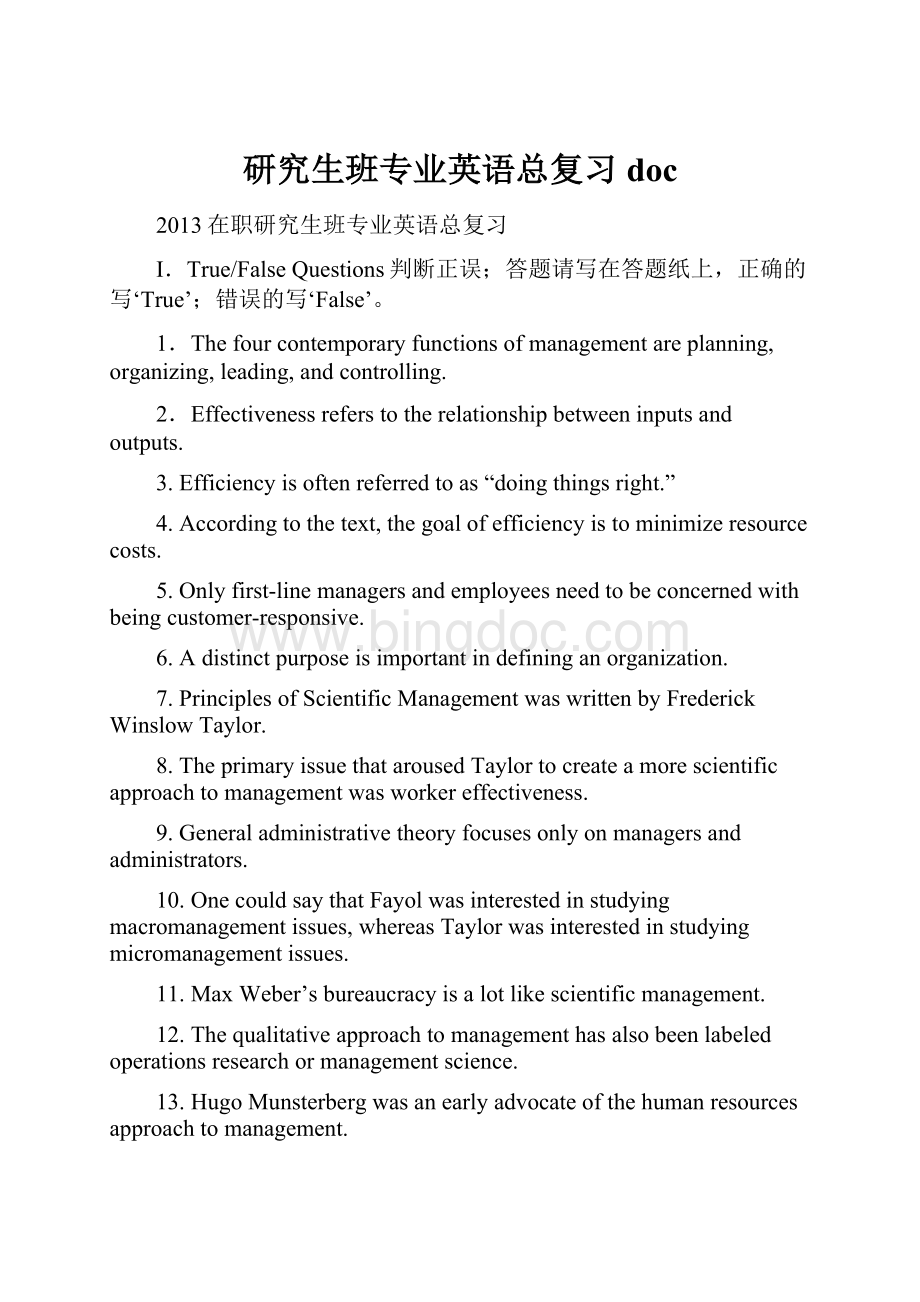研究生班专业英语总复习doc.docx
《研究生班专业英语总复习doc.docx》由会员分享,可在线阅读,更多相关《研究生班专业英语总复习doc.docx(16页珍藏版)》请在冰点文库上搜索。

研究生班专业英语总复习doc
2013在职研究生班专业英语总复习
I.True/FalseQuestions判断正误;答题请写在答题纸上,正确的写‘True’;错误的写‘False’。
1.Thefourcontemporaryfunctionsofmanagementareplanning,organizing,leading,andcontrolling.
2.Effectivenessreferstotherelationshipbetweeninputsandoutputs.
3.Efficiencyisoftenreferredtoas“doingthingsright.”
4.Accordingtothetext,thegoalofefficiencyistominimizeresourcecosts.
5.Onlyfirst-linemanagersandemployeesneedtobeconcernedwithbeingcustomer-responsive.
6.Adistinctpurposeisimportantindefininganorganization.
7.PrinciplesofScientificManagementwaswrittenbyFrederickWinslowTaylor.
8.TheprimaryissuethatarousedTaylortocreateamorescientificapproachtomanagementwasworkereffectiveness.
9.Generaladministrativetheoryfocusesonlyonmanagersandadministrators.
10.OnecouldsaythatFayolwasinterestedinstudyingmacromanagementissues,whereasTaylorwasinterestedinstudyingmicromanagementissues.
11.MaxWeber’sbureaucracyisalotlikescientificmanagement.
12.Thequalitativeapproachtomanagementhasalsobeenlabeledoperationsresearchormanagementscience.
13.HugoMunsterbergwasanearlyadvocateofthehumanresourcesapproachtomanagement.
14.TheHawthornestudieswereperformedattheGeneralMotorsplantbeginningin1924.
15.Thecurrentdominantassumptioninmanagementtheorysuggeststhatmanagersareomnipotent.
16.Intheomnipotentviewofmanagement,muchofanorganization’ssuccessorfailureisduetoforcesoutsidemanagement’scontrol.
17.Theorganizationalcultureisasystemofsharedmeaningheldbymembersthatdistinguishestheorganizationfromotherorganizations.
18.Amanager’sroleintheomnipotentviewofmanagementistocreatemeaningoutofrandomness,confusion,andambiguity.
19.Anincreasingbodyofevidencesuggeststhatstrongculturesareassociatedwithhighorganizationalperformance.
20.Ritualsarerepetitivesequencesofactivitiesthatexpressandreinforcethekeyvaluesofanorganization.
II.Multiple-ChoiceQuestionsForeachofthefollowingchoosetheanswerthatmostcompletelyanswersthequestion.Thereisonlyonebestanswerforeachquestion.答案请写在答题纸上。
每小题只有一个正确答案。
1.Whatarethetwoviewsofmanagerialimpactonthesuccessorfailureoftheorganization?
a.omnipotentandsymbolic
b.omnipotentandreflective
c.symbolicandinteractive
d.reflectiveandinteractive
2.Internalconstraintsthatrestrictamanager’sdecisionoptions_______________.
a.existwithineveryorganization
b.donotexist,asallmanagerscandecideastheyplease
c.existsonlytotheextentthatuppermanagementimposesthem
d.existonlytotheextentthatfollowerswon’tdoastheyaretold
3.Organizationalcultureissimilartoanindividual’s_____________.
a.skills
b.personality
c.motivation
d.ability
4.Corporate___________arerepetitivesequencesofactivitiesthatexpressandreinforcethevaluesoftheorganization,whatgoalsaremostimportant,whichpeopleareimportant,andwhichareexpendable.
a.languages
b.rituals
c.symbols
d.ceremonies
5.Whichofthefollowingisafundamentalcontributionofscientificmanagement?
a.Itcouldraiseacountry’sstandardofliving.
b.Itprovidedformanagementcontrol,abasicmanagementfunction.
c.Itprovidedthebasisforthecomingriseofunionization.
d.Itledtoloweroverallwages,therebyincreasingorganizationalprofitability.
6.OnecouldsaythatFayolwasinterestedinstudying___________managementissues,whereasTaylorwasinterestedinstudying________managementissues.
a.micro;macro
b.macro;micro
c.micro,micro
d.macro,macro
7.WhichofthefollowingisnotoneofFayol’sprinciplesofmanagement?
a.divisionofwork
b.unityofcommand
c.discipline
d.equality
8.The14principlesofmanagementareassociatedwithwhom?
a.Weber
b.Drucker
c.Taylor
d.Fayol
.9.Bureaucracydefinedasaformoforganizationcharacterizedby__________________.
a.divisionoflabor
b.clearlydefinedhierarchy
c.detailedrulesandregulations
d.alloftheabove
10.Supervisorisanothernameforwhom?
a.teamleaders
b.middlemanagers
c.first-linemanagers
d.topmanagers
11.Agencyheadorplantmanagerismostlikelyassociatedwithwhichofthefollowing?
a.teamleaders
b.middlemanagers
c.first-linemanagers
d.topmanagers
.12.Thedistinctionbetweenamanagerialpositionandanonmanagerialpositionis_______________.
a.planningtheworkofothers
b.coordinatingtheworkofothers
c.controllingtheworkofothers
d.organizingtheworkofothers
13.Effectivenessissynonymouswith_____________.
a.costminimization
b.resourcecontrol
c.goalattainment
d.efficiency
14.Insuccessfulorganizations,______________.
a.lowefficiencyandhigheffectivenessgohandinhand
b.highefficiencyandloweffectivenessgohandinhand
c.highefficiencyandhigheffectivenessgohandinhand
d.highefficiencyandhighequitygohandinhand
15.____________isthesetofongoingdecisionsandworkactivitiesinwhichmanagersengageastheyperformthemanagementfunctions
a.Themanagementprocess.
b.Planning.
c.Organizing.
d.Directing.
16._____________wasaFrenchindustrialistwhoidentifiedthebasicmanagementfunctions.
a.Weber
b.Taylor
c.Herzberg
d.Fayol
17.Writinganorganizationalstrategicplanisanexampleofthe______________managementfunction.
a.leading
b.coordinating
c.planning
d.organizing
18.Amanagerresolvingconflictamongorganizationalmembersisperformingwhatfunction?
a.controlling
b.commanding
c.directing
d.leading
19.AfinancemanagerwhoreadstheWallStreetJournalonaregularbasiswouldbeperformingwhichrole?
a.figurehead
b.monitor
c.disseminator
d.interpersonal
20.Theabilitytoworkwellwithotherpeople,bothindividuallyandinagroup,use________________.
a.technicalskills
b.behavioralskills
c.planningskills
d.humanskills
.III.Translation.
PassageOne
Consumerbehaviorisinfluencedbythreefactors:
cultural(culture,subculture,andsocialclass),social(referencegroups,family,andsocialrolesandstatuses),personal(ageandstageinthelifecycle;occupationandeconomiccircumstances;personalityandself-concept;andlifestyleandvalues).Thefourpsychologicalprocessesofmotivation,perception,learning,andmemoryalsoinfluenceconsumerresponsestomarketingstimuli.Researchintoallofthesefactorsprovidescluesastohowmarketerscanreachandsatisfyconsumersmoreeffectively.
Thefive-stagemodeloftheconsumerbuyingprocessconsistofproblemrecognition,informationsearch,evaluationofalternatives,purchasedecision,andpost-purchasebehavior.Themarketer’sjobistounderstandthebuyer’sbehaviorateachstage—frombeforetoafterthepurchase—andwhatinfluencesareoperating.Consumers’evaluationsofaproduct,basedonattitudesandbeliefsacquiredthroughlearningandexperience,willaffecttheirpurchasedecisions.Theattitudesofothers,unanticipatedsituationalfactors,andperceivedriskalsomayaffectthebuyingdecision,aswillconsumers’postpurchasesatisfaction,thecompany’spostpurchaseactions,andconsumers’postpurchaseuseanddisposaloftheproduct.Satisfiedcustomerswillcontinuetopurchase;dissatisfiedcustomerswillstoppurchasingtheproductandmaymakeunfavorableremarksaboutittoothers.
参考译文:
消费者行为受到三种因素的影响:
文化因素(文化,亚文化,和社会阶层),社会因素(参照群体,家庭,社会角色和地位),个人因素(年龄、生命周期所处阶段,职业和经济状况,个性和自我观念,和生活方式及价值观)。
动机、感知、学习和记忆四个心理过程也对消费者对营销刺激产生影响。
有关上述各种因素所进行的研究对营销者如何更为有效的接近(到达)和满足消费者提供了线索。
消费者购买决策的五阶段模型包括:
发现(认识)问题;信息搜索、评价可供选择的方案、购买决策和购买后行为。
营销者的工作就是了解购买行为的每个阶段--从购买之前到购买之后—以及说明因素在起(产生)作用。
消费者对产品的态度以及基于通过学习体验所获得的信念的评价将会对购买决策产生影响。
他人的态度,预料不到的其他情景因素和所感知的风险也可能影响到购买决策,消费者的购买后满意度。
公司的购买后行动,和消费者购买后对产品的使用和处置,同样也会购买产生影响。
满意的顾客会继续购买(该产品),而不满意的顾客会停止购买特定的产品并且可能对其他顾客发出有关产品不利的言论(口碑)。
PassageTwo
Strongcompaniesdevelopsuperiortechnologicalcapabilitiesinmanagingthefourcorebusinessprocesses:
thenew-productrealizationprocess,theinventorymanagementprocess,theorder-to-remittanceprocess,andthecustomerserviceprocess.Managingthesecoreprocesseseffectivelymeanscreatingamarketingnetworkinwhichthecompanyworkscloselywithallthepartiesintheproductionanddistributionchain,fromsuppliersofrawmaterialstoretaildistributors.Companiesnolongercompete–marketingnetworksdo.
强势公司在管理四种核心业务流程造就了高超的技术能力:
新产品实现上市流程,库存管理流程,订货-发货流程,以及客户服务流程。
有效管理这些核心流程意味着创立与从原材料供应商到零售分销商生产的生产分销链条中各方紧密合作的营销网络。
公司不再进行竞争—竞争的是营销网络。
Losingprofitablecustomerscandramaticallyimpactafirm’sprofits.Thecostofattractinganewcustomerisestimatedtobefivetimesthecostofkeepingacurrentcustomerhappy.Therefore,oneofthemarketer’smaintasksiscustomerretention.Thekeytoretainingcustomersisrelationshipmarketing.Tokeepcustomershappy,marketerscanaddfinancialorsocialbenefittoproducts,and/orcreatestructuraltiesbetweenthemselvesandtheircustomers.However,marketersshouldavoidretainingunprofitablecustomers.
失去赢利(有利可图的)顾客可能对企业的利润产生重创。
吸引新顾客的成本据估算是维持现有顾客满意的(成本)的五倍。
因此,营销者的主要任务之一就是顾客保留(留住顾客)。
留住顾客的关键在于关系营销。
要使顾客满意,营销者可以在产品上增加财务或社会方面的利益(好处),并且/或创建企业与客户之间的结构性的密切关系。
然而,营销者应当避免保留非赢利的顾客。
Wecanseehowtheproductlifecycleworksbylookingattheintroductionofinstantcoffee.Whenitwasintroduced,mostpeopledidnotlikeitaswellas"regular"coffeeandittookseveralyearstogaingeneralacceptance(introductionstage).Atonepoint,though,Instantcoffeegrewrapidlyinpopularityandmanybrandswereintroduced(stageofrapidgrowth).Afterawhilepeoplebecameattachedtoonebrandandsalesleveledoff(stageofmaturity).Saleswentintoaslightdecline(衰